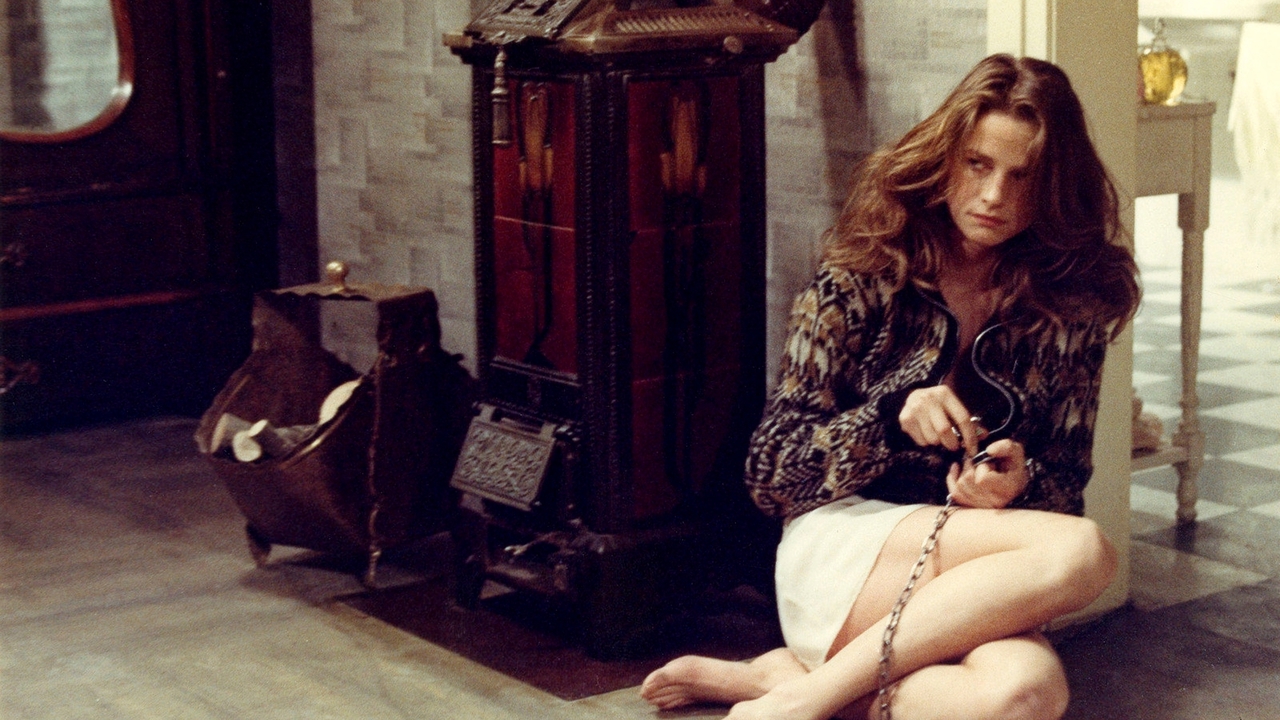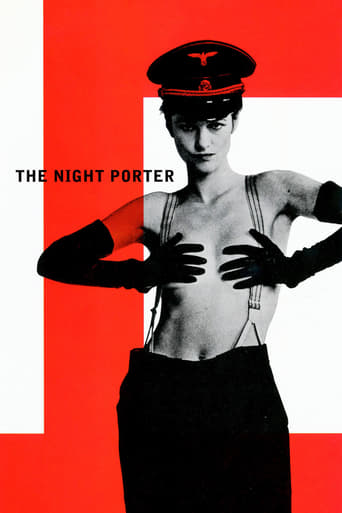

People are voting emotionally.
... View MoreMasterful Cinema
... View MoreIt’s fine. It's literally the definition of a fine movie. You’ve seen it before, you know every beat and outcome before the characters even do. Only question is how much escapism you’re looking for.
... View MoreOne of the best movies of the year! Incredible from the beginning to the end.
... View More1957, Vienna. Morose and reserved ex-Nazi Max (superbly played with tremendous restraint by Dirk Bogarde) keeps a low profile by working as a night porter at a posh hotel. Max by chance gets reunited with concentration camp survivor Lucia (a very strong and fearless performance by Charlotte Rampling) and resumes the dangerous sadomasochistic affair that they started back in the 1940's.Director Liliana Cavani relates the absorbing story at a hypnotically languid pace, ably crafts a hauntingly bleak and melancholy tone, explores the severe emotional and psychological damaged wrought by the Third Reich with unflinching candor and directness, and follows the doomed romance between the deeply troubled main characters to its inevitably grim and tragic conclusion. Most importantly, although the twisted premise skirts with exploitation, Cavani's elegant style prevents the plot from degenerating into tasteless sleazy trash. Bogarde and Rampling do sterling work in their demanding roles; they receive sturdy support from Philippe Leroy as the sinister Klaus, Gabriele Ferzetti as the snoopy Hans, Isa Miranda as the dissipated Countess Stein, and Amedeo Amodio as junkie dancer Bert. The bold and incisive script by Cavani and Italo Moscati blurs the lines between love and hate as well as pain and pleasure with genuinely unsettling, yet still provocative results. Alfio Contini's sumptuous cinematography and the lovely classical music score by Daniele Paris further enhance the overall supremely classy decadence. A deliciously dark, daring, and deviant gem.
... View MoreW.A.Mozart wrote sublime music - surely the ultimate expression of the beauty of the human mind - including "The Magic Flute",referred to by Neville Cardus as "The only opera that could conceivably have been written by God" which features extensively in "The Night Porter". On the other hand,the Nazis - presumably God's worst nightmare - fulfilled the polar opposite expression of the human mind and it is the clash of these two cultures and their affect on men and women faced with extraordinary stresses that the film explores. Max and Lucia - former prisoner and captive - have a savage and sadistic relationship dating from the Death Camps which is rekindled a dozen years later. Max is outwardly a clever,cultured and charming man,but he is wracked with guilt and fear over the possibility has past will be revealed. Lucia has her own guilt issues because of what she did to survive the Holocaust. Music plays a strong part,from the ballet dancing Nazi Officer to the song Lucia sings to entertain her captors,and its constant counterpoint to the action on the screen. When news of Lucia's re - appearance reaches Max's fellow ex - Nazis,they demand she should be killed,but he runs away with her instead sealing both their fates. Mr D.Bogarde and Miss C.Rampling are both extraordinary in this film, a performance equal to his in "The Victim" and one she has never approached since. It is not easy to watch but I recommend it wholeheartedly because it shows that love - albeit an unusual kind - will endure.
... View MoreI first saw this film at an open air (outdoors) cinema in sunny Australia a hundred yards from the beach and ocean on a warm night. I was immediately captivated by the rainy ,misty atmosphere of 1950's Vienna in the opening credit sequence as Max strolls to work with his umbrella and black trilby hat.It was like reading a period European novel. The 1950's cars (Simcas, Volkswagens,Saab etc.)the clothes , the plush period interior of the Opera Hotel and the carefully chosen locations of the ancient streets around Saint Stephens Cathedral ,Vienna give it a look of period reality and authenticity. The film moves at a real human pace - (no Computer Generated Explosions , Dragons, etc.) and so we are drawn into this human triangle from the start -like watching real life ( it is based on true events).Okay , the film presents religious problems ( Jew and German together) political problems ( hiding fascists) and some odd lovemaking - but whose life doesn't have problems at some point - and it is an over fifteen film. It is great viewing and I highly recommend it.
... View MoreThe Night Porter is a film that earned a controversial reputation back in the 70's when it was made. In truth, it still has retained a lot of its infamy even today. The reason for this was that it was considered by some as being exploitative and for trivialising the Holocaust. Perhaps more specifically, its mixture of eroticism with Nazis is one that I am guessing has the power to make people feel very uncomfortable. Its story centres on Max, a night porter working in a Vienna hotel in 1957. One day a young woman guest called Lucia arrives at the hotel and his past catches up with him. It turns out he was an S.S. officer who worked at a concentration camp during WWII and Lucia was an inmate who he used as a sexual slave. Their chance encounter leads them to embark on another dark sexual relationship but with slightly different power dynamics. Meanwhile former Nazi comrades of Max have become aware of the situation and plan to silence Lucia who is a potential witness to their war crimes.The central plot idea that underpins the narrative is the Stockholm syndrome. This is a known psychological condition where those repressed and incarcerated form romantic bonds with their captors. It's especially troubling here in that the master and servant are an S.S. officer and his Jewish victim. The sheer real life horror of the Holocaust ensures that this is dark waters for the basis of a film. But overall, despite pushing several provocative buttons along the way, this isn't a very exploitative film. It's certainly a long way away from the Nazisploitation cycle of films that emerged in Italy shortly after this one. Those films were unashamedly sexploitation flicks that really were pushing the limits of good taste. In fact, one of the more notorious examples The Gestapo's Last Orgy also features a dark romance between a camp commandant and Jewish girl, although that's more or less where comparisons end with The Night Porter. No, this is actually a pretty sober and cold movie with a focus squarely on the psychological aspects rather than the salacious ones. It examines a damaged woman's strange compulsions and the inconsistent impulses of her ex-Nazi captor.Although, to be perfectly honest, I felt the film itself is most memorable cinematically when it does feature the flashbacks to the concentration camp. These scenes are always presented in an unreal, dream-like fashion. They never seem very real and this I guess gives the film a bit of overall distance which allows it a bit of leeway regarding its controversial subject matter. Those scenes do feature some very sinister yet surreal moments like the death carnival ride. Yet they often are simply strange such as the S.S. man who performs a homo-erotic ballet routine for his fellow Nazis or Lucia's erotic song and dance number replete with Nazi regalia, which is a sequence that really accentuates the Nazi erotica angle which is understandably problematic for some.The film benefits considerably for having Dirk Bogarde and Charlotte Rampling in the central roles. These are difficult characters for actors to tackle to say the least but these two are pretty fearless performers. The acting style is very mannered, as opposed to realistic but this fits in with the overall detached feeling that the film has as a whole. This goes against it a bit to be fair, as it isn't always as engaging as it could be and the pace is pretty slow. It means that this is a film with considerable interest in terms of brave subject matter but one that isn't very easy to connect with. Although given the central idea, this may not be strictly such a bad thing.
... View More